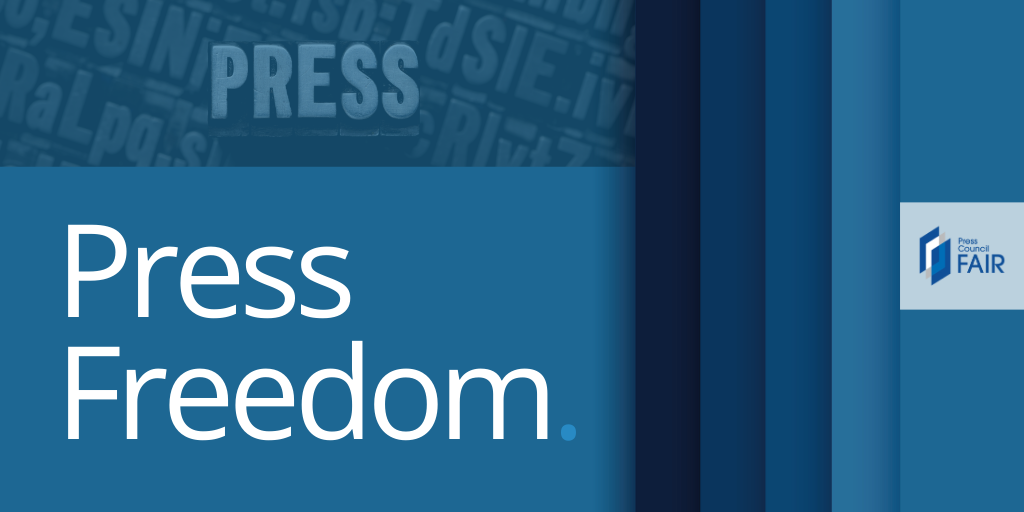The Press Council and the ethical limits of freedom of opinion
Earlier this week, the Independent Media group of newspapers were expelled from the Press Council of South Africa (PCSA) after they refused to comply with two rulings which had found that opinion pieces had transgressed the wide boundaries within which the freedom to express one’s opinion is protected.
One piece labelled Karyn Maughan a fraud, an apartheid-style disinformation agent and a racist. Another described Gillian Moodie as a propaganda journalist, a member of a white boys’ club, a virtual plant of the DA in its newsrooms and a racist.
Neither of these articles were fact-based, which is one of the requirements rendering an opinion fair and justifiable, even in cases where it may be – as clause 7.2 of the Press Code puts it – ‘extreme, unjust, unbalanced, exaggerated and prejudiced’.
The other requirements are that the comment must be on a matter of public interest, not be misrepresented as fact, and without malice.
As soon as an opinion piece ticks these boxes, it enters a ‘safe harbour’ (as previous PCSA findings have called it) within which the publisher’s right to publish it and keep it online, is protected.
While the boundaries drawn by our Constitution, our courts, the law and the Press Code are wide, they are clear. And by enforcing them and holding transgressors accountable, the Press Council protects the right to freedom of expression from abuse, thereby safeguarding it
The Press Council is an independent co-regulatory body for print and digital media, which requires its members to adhere to a Press Code of Ethics and Conduct. It is chaired by a retired judge nominated by the Chief Justice, and staffed by an Executive Director, Ombud, Deputy Ombuds, and Public Advocate, each selected by an Appointments Panel headed by another retired judge nominated by the Chief Justice.
The Ombud, Deputy Ombuds and Appeal Panel (also headed by a retired judge) decide on complaints brought by members of the public against publications which subscribe to the Press Code. If found to have contravened the Code, members may be ordered to retract, apologise for, or amend an article, or even remove it from the Internet in extreme cases.
This system is robust, time-tested, and internationally-recommended. It ensures that the media are independently and impartially regulated, without government interference.
While the Press Council is a voluntary institution, it is formally accredited by the Information Regulator and the Film and Publication Board.
The Moodie complaint
Independent Media was a founding member of the Press Council, but left in late 2016, due to dissatisfaction with the Council’s abandoning a waiver in terms of which complainants agreed not to take their complaint to court if they chose to institute a PCSA complaint.
The departure came shortly after the Ombud found that one of their articles breached, among others, clause 3.3 of the Code, which requires the media to exercise care and consideration in matters involving the dignity and reputation of individuals, in this case the journalist Gill Moodie.
The Ombud ordered Independent to apologise to Moodie for ‘unfairly, and without any proper substantiation or proof, labelling her as a propaganda journalist, a member of a white boys’ club, a virtual plant of the DA in its newsrooms, a racist, and for making allegations against her of malice, aspirations to maintain white control and collusion, as well as its accusations against her regarding misinformation and sabotage against [Independent Media], its Executive Chairman and associated companies and all its employees’.
Independent was granted leave to appeal against the sanction, but left the Council without pursuing the appeal – and without apologising to Moodie.
When Independent rejoined the Press Council in January this year, Moodie requested compliance with the Ombud ruling. Independent refused to apologise.
The Maughan complaint
In March this year, shortly after rejoining the Press Council, Sunday Independent and IOL published a column entitled, ‘Is Karyn Maughan South Africa’s Leni Riefenstahl – the Nazi Film Propagandist?. The body of the article amplified that comparison, and also accused Maughan of being a fraud, an apartheid-style disinformation agent, and a racist.
The Deputy Ombud, Franz Krüger, assisted by two adjudicators (law professor Karthy Govender and veteran journalist Joe Thloloe), ruled that the comparisons and accusations in the article were not based on facts that were true or reasonably true, and thus could not amount to protected comment.
Among other things, the article was found to have contravened clause 3.3, and Independent was ordered to apologise to Maughan and remove the article from IOL.
The Chair of the Appeals Panel, retired Judge Bernard Ngoepe, refused leave to appeal, finding that the original ruling could not be faulted.
In response, Independent Media refused to comply with the ruling, and in several articles, accused the Press Council of being corrupt, biased, racist and akin to an apartheid censorship body.
Why was Independent Media expelled?
Independent Media is only the second member to be expelled from the Press Council. In May 2022, the South African Jewish Report was expelled after it refused to apologise for an article which, the Ombud and the Appeals Panel Chair found, asserted as fact (rather than clearly presented as comment or opinion) that the SA BDS [Boycott, Divestment, sanctions] coalition was anti-Semitic
Compliance with Ombud and Appeals Panel rulings is a compulsory condition for Press Council membership.
Independent Media was thus expelled for the same simple reason as the SA Jewish Report – refusal to comply with a final and binding ruling.
What is protected comment?
These expulsions, and the rulings that led to them, have placed a spotlight on the limits to the right to express opinions freely.
Independent Media’s defence to the Maughan complaint was essentially that, if an opinion is clearly presented as an opinion, anything goes. While that may be a commonly held view, it is not what the law says, and not what the Press Code says. While section 16 of the Constitution entrenches the right to freedom of expression, section 10 guarantees the right to human dignity. And section 36 states that any right may be limited to an extent that is reasonable and justifiable in an open and democratic society based on human dignity, equality and freedom
In Khumalo v Holomisa, the Constitutional Court found that our common law of defamation, and the defences embedded in it, strike a constitutionally appropriate balance between free speech and dignity.
One such defence is known as fair comment. It is an age-old defence that permits damage to a person’s dignity or reputation as long as the publication is presented as comment, is based on facts that a true and clearly stated, and is expressed on a matter of public interest, without malice (meaning ulterior motive).
As confirmed in The Citizen v McBride: ‘The law does not allow the unjustified savaging of an individual’s reputation. The right of free expression enjoyed by all persons, including the press, must yield to the individual’s right, which is just as important, not to be unlawfully defamed.’
Paraphrasing from that judgment, clause 7.2 of the Press Code states: ‘Comment or criticism is protected even if it is extreme, unjust, unbalanced, exaggerated and prejudiced, as long as it is without malice, is on a matter of public interest, has taken fair account of all material facts that are either true or reasonably true, and is presented in a manner that it appears clearly to be comment.’
In other words: We are free to publish opinions, but we are not free to hurl insults without any factual basis
When Sunday Independent was asked to indicate any factual foundation for their claims about Maughan, they were unable to do so, and argued that the Code did not require them to do so.
Free but fair
The Press Code does not stand for absolute free speech – it stands for ethical and responsible free speech. The media must be free, yes, but they must also be fair, as the Press Council’s very logo proclaims.
Safeguarding something also means protecting it from abuse. Safeguarding free speech thus necessarily entails holding those who abuse it accountable.
The Press Council’s preamble emphasises that the media serves society by enabling informed judgments and independent scrutiny – key to a democratic South Africa. In expelling Independent Media, the Press Council did not act as a ‘censor’, but simply upheld its Code and the democratic values that underpin it, ensuring that freedom of expression is exercised lawfully.
- Viljoen and Winks are media lawyers and public representatives on the Press Council’s Panel of Adjudicators




